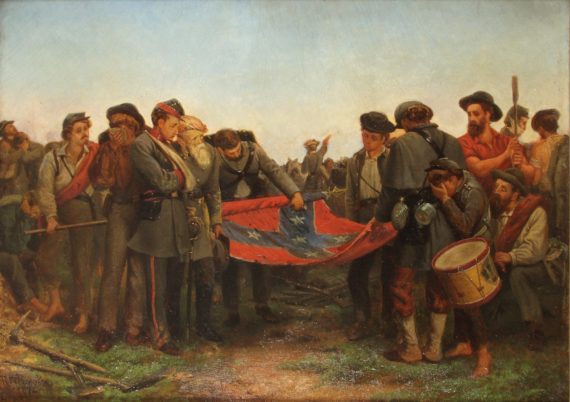
In a recent column, “Nationalism vs. Secession: Should America Break Up? (July 27), I included references to an essay I had published at THE UNZ REVIEW (July 26), and then which was picked up nationally by a number of other Web magazines, including LewRockwell (July 29) and The Abbeville Institute (August 2).
For that essay “Nationalism vs. Secession,” I added a new introduction in which I briefly discussed a recent “National Conservatism Conference” held in Washington DC on July 14-15, and I mentioned that evidence exists that its organizers (e.g., Yoram Hazony, David Brog, etc.) had as their purpose to attempt to “corral” and in some way assert control over the increasingly restless American nationalist and populist elements (and they are not necessarily the same). In a sense those “dissident” elements had been awakened and given new life by the election of Donald Trump who was not by definition an Establishment Conservative, that is, not a card carrying member of what some writers call “Conservatism Inc.”
I quoted some fascinating pieces on this effort at control, in particular essays by Dr. Paul Gottfried and journalist Christopher DeGroot (editor of The Agonist). In Christopher DeGroot’s essay he mentions that even though conference organizer David Brog announced at the outset that the conference would NOT consider anything concerning ethnicity—this topics was off limits to the “conservatives” gathered there—at least one intrepid conference speaker in her remarks, Dr. Amy Wax, Professor of Law at the University of Pennsylvania, transgressed the taboo. And the reason is quite obvious: how can anyone discuss what is going on in America today…how can there be any talk of nationalism or so-called “national identity”…how can we hope to comprehend the rise of populism…how is it possible to understand the ideological narrative of the lunatic progressivist social justice warriors who completely dominate one political party and scare the hell out of the other…without examining the huge pink elephant in the room, the very difficult topic of how mass immigration and disparate ethnicity fit into these discussions?
Professor Wax’s presentation was met by the academic and media establishment with horror and charges that she was—of course—a racist. But the facts speak for themselves. In her presentation she focused exclusively and significantly on ethnicity from a strictly cultural perspective, that is, what the unlimited infusion of essentially “unmixable” Third World immigrants is doing to what is left of traditional American culture, and the effects it is having on our historic institutions.
Certainly, the effects of ethnicity must be considered because the simple fact is how ethnic diversity and homogeneity are viewed and treated determines in many ways how our society responds and, critically, how it exists as a culture and a polity. Historical examples abound, and historical efforts to meet multi-ethnic situations can provide a valuable roadmap.
Here we can cite several notable historical examples. There is, of course, the Roman Empire and its diverse system of subinfeudated kingdoms and satrapies. Then, of course, there is the British Empire and how it existed and, for a couple of centuries, thrived; or the multi-lingual and multi-national Austro-Hungarian Empire: just several examples.
And in these cases, there were certain “keys,” certain essentials that basically kept those imperial states more or less in unity or confederation.
In the more recent British and Habsburg cases there were revered monarchs whose influence and nearly sacral positions went well beyond ethnicity and local nationality. Those monarchs symbolized the authority which united in very special ways all the different peoples of the divergent states under their rule. A Hungarian might differ ethnically from a Bosnian and speak a completely different language, for instance, but both could revere the emperor in Vienna and the dynasty which reached back to the early Middle Ages as a symbol of continuity, history, and a quasi-religious and civilizational mission.
Then, both the Brits and Habsburg understood—in some cases, had to learn the hard way—that regionalism, local control, and autarky were essential if the empire was to stay together. Thus, the functioning British Raj in India and the series of “sub-monarchies” and states under the British crown. Thus, the Habsburg understanding in 1867 that Hungary must have its own local and national authority, but, of course, under the old Kaiser (as King/Konig, of Hungary), Franz Josef. And Franz Josef’s heir, the Archduke Franz Ferdinand wanted to extend that regional autonomy and self-government under the Kaiser to Slavic regions of the empire as well. Indeed, that was one of the precise reasons he was assassinated in June 1914 by a Serb ultra-nationalist—to keep him from following through on that program (which might well have prevented the break-up of the Austro-Hungarian Empire).
Interestingly, as a kind of an illustration of this: the famous Czech composer Bedrich Smetana (1824-1884), whose popular “Ma Vlast” (“My Country”) symphonic poems and opera The Bartered Bride are world famous, was a fervent supporter of what could be called “Czech nationalism.” In a real sense he was the founder of modern Czech classical music. Yet, in 1853 he composed his “Triumphal Symphony” which combines the Habsburg national anthem, “Gott erhalte Franz den Kaiser” in a moving final musical apotheosis—celebrating the young Habsburg monarch in Vienna, with a hope expressed in music that the empire would recognize the regionalist and popular aspirations of the Czech peoples under the German Habsburg dynasty…perhaps like what later occurred with the Hungarians.
All of this is to say, in summary, that countries with divergent populations, with differing ethnicities and historical backgrounds and traditions may only successfully exist with a modicum of liberty if those differences are fully taken into account and acknowledged publicly and in law constitutionally…and if those differences do not reach a breaking point where conversation, respect, commonality, and adherence to certain central principles cease to exist.
What the Establishment Conservative movement fails to understand is that the creaky old American “nation,” certainly since the defeat of the forces of Constitutionalism and States’ Rights on the battlefield in 1865, has become what the authors, the Kennedy brothers (Donald and Ronald), call the “Yankee Empire,” an administrative super-state where a concentrated and largely-untouchable and unelected managerial bureaucracy and political and academic class, essentially suppresses us as virtual retainers and enslaved subjects.
The Achilles’ Heel and undoing of this Yankee—American—Empire is what Dr. Wax notices with alarm: its open door welcome to continuing waves of non-assimilable immigrants, enthusiastically supported by open borders groups (progressivists in league with corporate business types). And with this uncontrolled influx of immigrants there has come a concomitant unhinged ideological multiculturalism, enforced by a frenzied and rigid political correctness in both law and practice…and not just for the new immigrants, but for native citizens, as well.
For the open borders template is only part of a vision of America as a kind of “global nation” in which there is no nationality save “citizenship in the world” and in which regional character and historical traditions, ethnicity, religious belief and heritage, and shared common experience are all rigidly subsumed and, in effect, abolished in the name of an amorphous concept of “humanity,” to be guided by progressivist ideologies of race and gender, and zealous opposition to heritage and historic identity.
Our constitutional, states’ rights traditions and our regionalist heritage have been a bulwark historically against the power of such administrative aggrandizement. Those advancing the globalist program understand that for their template to triumph, that constitutionalism, our traditions, and our regionalism must be suppressed, and “population replacement” through mass immigration is a major constituent of this long-range strategy.
This globalism, let it be said, is not so much the opposite of American nationalism (which it attempts to harness and divert through such efforts as the “National Conservatism Conference”), as it is the inverse of genuine and rooted American populism and historic regionalism which have never been completely extirpated, despite the best efforts of the administrative state.
Especially since the election of Donald Trump in 2016, the globalist program has run into serious roadblocks. Not only have unregulated immigration and millions of essentially indigestible immigrants become a major issue and concern to millions of American citizens, but severe ideological and cultural differences among native citizens have come sharply into focus, reminiscent of the radical differences just prior to the outbreak of the War Between the States in 1861. And with this there is also a nascent rebirth of regionalism and separatism (as witness the growth of such movements as Calexit in California).
Despite the continuing frenetic attempts from the top, from the central state, to control and suppress such tendencies, what actually appears to be happening is, practically speaking, a de facto centrifugal “break up” of the American Empire into divided belief structures and uncommunicating divisions which are very probably not reparable. And often these extreme divisions are not just regional, but intra-state and city-versus-rural. In effect the genie is out of the lamp, and Humpty-Dumpty has fallen and shattered into a thousand pieces, and most likely very little can be done to put those pieces back into an American whole.
The Progressivists recognize this, and, in a way, it explains their relentless and frenetic efforts to suppress any and all opposition to their plans and ideological template, including de-legitimating any discordant voices, enacting new “civil rights” and gun laws, and now Internet censorship. In other words, the suppression and subjugation of one part of America by another part, with no limitations on methods, all to control a nation that in fact appears to be breaking up.
This is something that lurks as an underlying cautionary note in Professor Wax’s address. No: she does not advocate secession or separation, at least not yet. But her well-thought-out observations and commentary offer a dire warning: our present policies of immigration and domestic favoritism of radically and culturally discordant Third World populations are pointedly against our native population which is largely white, but also includes native blacks who have been here since colonial times.
As a part of the swirling maelstrom and rapidly devolving, unbridgeable divisions already present in our society, this may well lead to a situation where at least one of the three potential scenarios I have written about earlier may occur:
Either a continuation of the present course, with one group—most likely the post-Marxist Progressivists—basically subjugating any opposition, and the disappearance of America as we have known it into some globalist state where our remaining liberties will have disappeared.
Or, there will be some climatic event, perhaps a mammoth depression or war, and a collapse followed most probably by a fierce dictatorship: political order abhors a vacuum.
Or, finally, and despite our hesitation to imagine it: a kind of separation or secession (such as now in California and elsewhere), including such actions as state interposition or nullification. Indeed, steps in this direction are already occurring with states and cities basically ignoring the Federal government on sanctuary city status. Of course, in such an eventuality most likely large population exchanges would occur.
Dr. Wax in her remarks is attempting to raise (as Thomas Jefferson once wrote about the Missouri Compromise) “a fire bell in the night.” Our national policies that favor Third World immigration and an open door are destructive of what is left of the country’s unity. And, given the already stark divergences among our citizenry, she adds, it may already be too late….And, then, what is left? Chaos, dictatorship, or separation?
Looking at America in 2019 that is the question that should be raised. The American Empire has not had the good sense of the Habsburgs or the Brits; rather after 1865 it commenced upon a journey of active empire-building, continuing to destroy the already gravely-wounded and impaired rights of the states and the citizens of those states. Our government elites erected what my late mentor (and founder of the Old Conservative movement) Dr. Russell Kirk called the “Pax Americana.”
And now, with many decades of academic post-Marxist revolutionary indoctrination in our schools and our colleges, and the perversion of our cultural environment, and the sovietization of our media, those future “factions” that James Madison warned about in The Federalist have emerged with a terrible ire and desire for vengeance, and an irreducible nature that forces us to consider what will happen and how we should prepare for it.
Are secession and separation in this country’s future?






